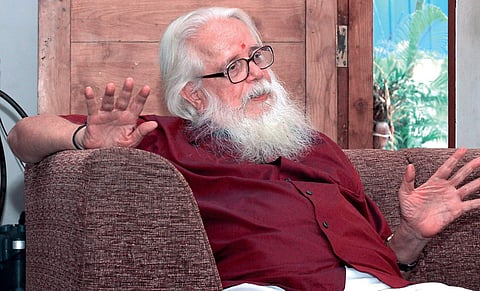

THIRUVANANTHAPURAM: Circa 1970. A young Indian, S Nambi Narayanan, pursuing his higher studies at Princeton, US, is offered a US citizenship. He refuses, choosing instead to return to India and the fledgling Indian space programme which employed him.
“I never regretted that decision until the spy case happened,’’ seated in his home at Perunthanni, Thiruvananthapuram, Nambi Narayanan said on Monday.
For 20 years, the former space scientist has fought bitter court battles for justice, but today he also has another demand. He wants a reinvestigation into the spy case - to establish the motive.
"Investigation agencies categorically said the case was fabricated. But what were the motives behind cooking up such a tale? Further investigation is needed to bring that out. People are talking about reopening the Bofors case, then why not the spy case? If there’s a crime, someone did it. And that someone had a motive,’’ he says.
More than two decades after the spy scandal broke, smashing lives and careers and blackening the image of the Indian Space Research Organisation, this man - the prime accused who was later found innocent by both the CBI and the Supreme Court - is getting ready to publish his biography ‘Ormakalude Bhramanapatham.’
The book, which delves into murky depths of the spy scandal, will be out on Thursday. Personally, he does not believe in the theory that the CIA cooked it up on its own. They may have made use of an opportunity that came their way, he believes. He prefers to call the spy scandal a "collective crime.’’
‘Ormakalude Bhramanapatham’ is both an autobiography and a book which tells the story of ISRO, how it evolved over the decades, says Nambi Narayanan. "I was one of the early birds there. It was just a ‘facility’ then, with just 23 people. Now there are about 25,000,’’ he says with a laugh. "I want the younger generation to know what ISRO is, how it grew and who were the people behind it; people like Vikram Sarabhai, Satish Dhawan, U R Rao and Kalam,’’ he says.
The spy case, being an inseparable part of the ISRO story, takes up 10 o 15 per cent of the book. The case broke on October 20, 1994, with the arrest of Mariam Rasheeda, a Maldivian national. Nambi Narayanan, project director for the cryo programme, was arrested on November 30. The book tells "exactly what has happened and my interpretations and why I say so,’’ he says. The case, he says, was peppered with loopholes from the start. ‘Ormakalude Bhramanapatham’ also features a translation of the closure report filed by the CBI. ‘’Few have read it. It demolishes the spy tale,’’ he says.
Among other things, the book relates India’s quest for the cryogenic technology, and how the Americans and the French were mightily piqued when ISRO chose the Russian KVD-1 technology over theirs. Also related is the tale of the Vikas liquid-fuel engine, now extensively used in the PSLV and GSLV rockets.
Nambi Narayanan says he named it ‘Vikas’ - it was modelled on the French ‘Viking’ engine - after Vikram Sarabhai. Nambi writes about Sarabhai’s mysterious death, at the Halcyon Castle in Kovalam. He hints at foul play.
"He had been meeting people till 11 pm the previous night. Then he goes to sleep and in the morning he is found dead. No post-mortem was conducted. If you ask me, it was not a natural death.’’
The book also mentions his one and only subsequent encounter with Siby Mathews, the senior cop against whom he has been seeking action.‘Ormakalude Bhramanapatham,’ published by Current Books, will be released by Shashi Tharoor MP at the Thiruvananthapuram Press Club hall on Thursday.